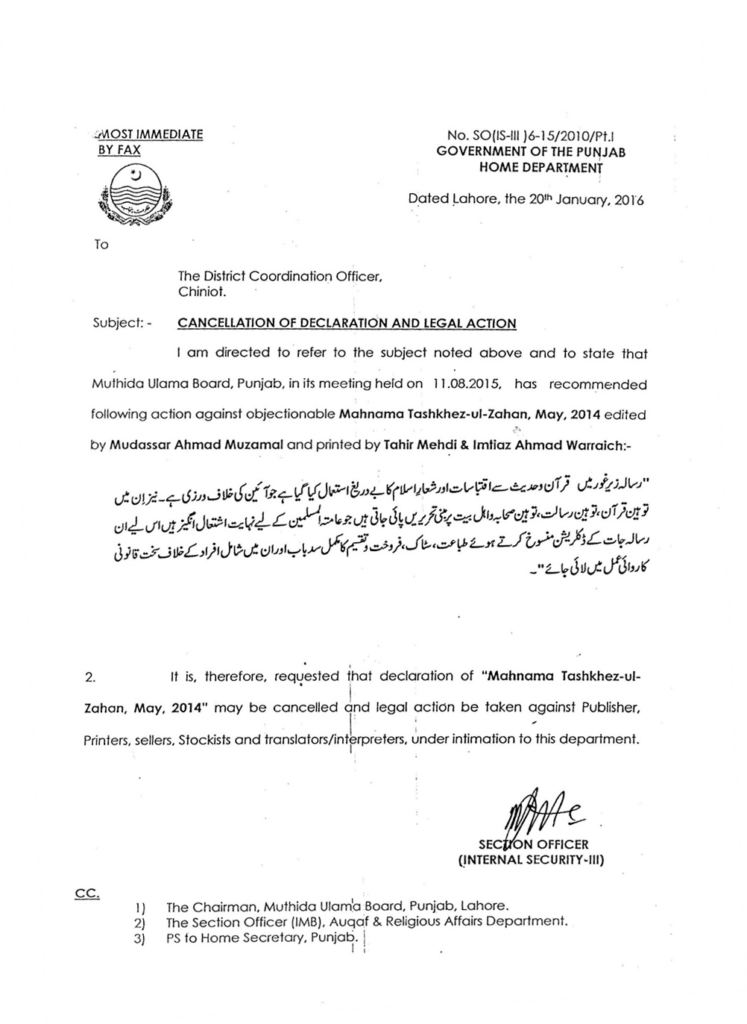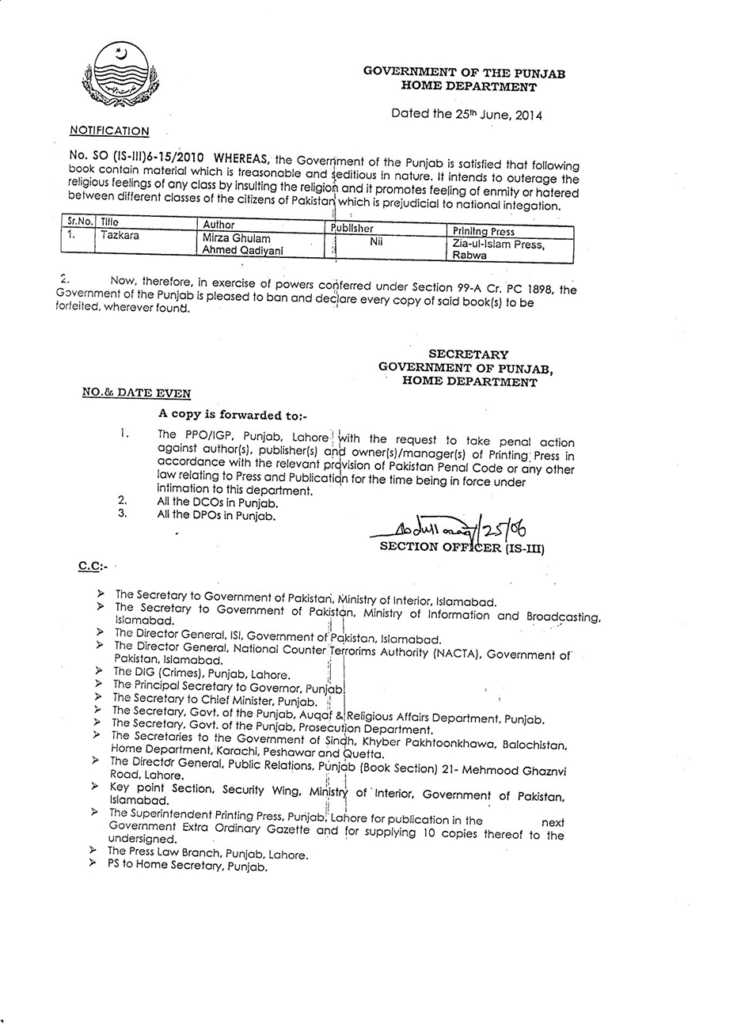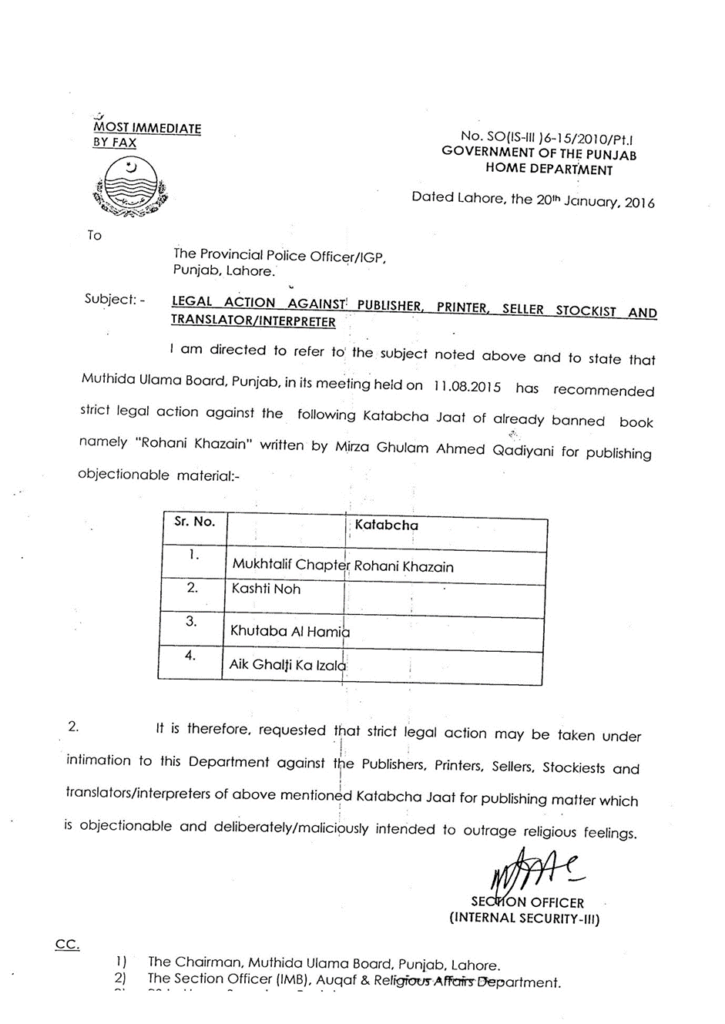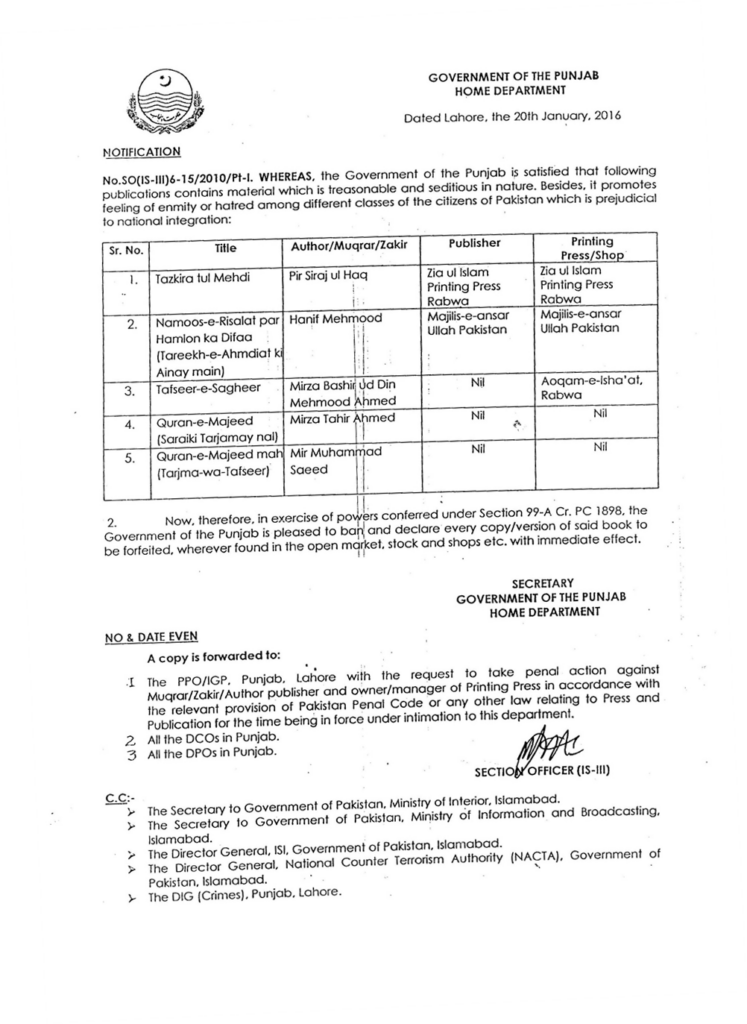In recent years, authorities, in league with mullas, have taken steps to put sweeping restrictions on Ahmadiyya press and publications. These restrictions are discriminatory, Ahmadi-specific, in violation of the Constitution and even the overall state policy. Their severity and absurdity are incredible. Through these, the state has unabashedly trampled upon fundamental freedoms of Ahmadis and created a suffocating climate of official interference and oppression.
For the purpose of this brief, the restrictive drive can be divided into three parts: 1) Against Ahmadiyya daily and periodicals, 2) Banning of books authored by the holy founder of the Ahmadiyya community, 3) Ban on Ahmadiyya translations of their primary scripture, the Holy Quran.
The government has banned the Ahmadiyya community’s daily newspaper Al-Fazl and all the periodicals separately meant for children, women, youth and elders. By doing so, it has effectively gagged the community and deprived the members of their info lifeline with their head, the Centre. This is tyranny, specific to Ahmadis, as the rest of the population enjoys a fair amount of freedom of press and speech.
1. The daily Al-Fazl and periodicals
In 2015 the Government of Punjab most unjustifiably banned various Ahmadiyya periodicals published from Rabwah, the community’s national centre, located in Punjab. The community approached the high court for redress, and it issued ‘stay orders’ concerning the daily and periodicals, so these continued to be published.
However, undeterred by the court orders and disregarding national commitment to international instruments and covenants on human rights and freedom of religion or belief, the provincial government issued fresh orders in January 2016 to ban numerous Ahmadiyya books and all the periodicals – this time quoting the recommendations of the Ulama Board as the authority for taking this action of which any decent democratic government would be ashamed. A set of six such letters were issued by the Home Department on January 20, 2016.
While issuing orders on cancellation of declarations of various periodicals, the recommendations of the Muthida Ulama Board Punjab were quoted in original, in vernacular. We translate below the opening two lines of the recommendation concerning the Ahmadiyya children’s monthly Tashheez-ul-Azhan of May 2016:
“In this magazine extracts of the Quran and Hadith and Sha’ire Islam have been extensively used that is a violation of the Constitution. Also in these, there are texts that defile (Tauheen) the Quran, the Prophethood, the Companions and the (Prophet’s) Family, which is highly provocative to common Muslims….”
The mullas are wrong on all counts, and the Punjab authorities know it. The Constitution of Pakistan does not forbid anybody quoting extensively the Quran or Hadith. Also, it is a plain falsehood that the texts blaspheme or defile as alleged. The Ulama Board could not quote a single line in support of their grave accusation.
The signing section officer dutifully sent a copy of this letter to the chairman of the Ulama Board, of course as a token of the government’s compliance with their wishes. He accorded “MOST IMMEDIATE” priority to this order, unbecoming any modern democracy.
In issuing these orders, the authorities violated their own standards and employed unsupportable discretion. They wrongfully curbed freedom of expression and opinion of a peaceful law-abiding community.
The government of Punjab should be told by the Federal Government to withdraw its unlawful, unbecoming and anti-people orders issued by the Shahbaz Sharif government in compliance with the wishes of Islamist clerics of a Board that has no constitutional standing.
2. Banning of books of the holy founder of the Ahmadiyya Jamaat
In the year 2016 the Government of Punjab issued orders banning entire written works of the founder of the Ahmadiyya community.
This enormity was also committed by the government on the recommendation of the Muthida (Joint) Ulama Board. Banning the written works of the founder of Ahmadiyyat is somewhat equivalent to if the Bible were banned in Iran or the Book of Mormon was proscribed by the state of Utah in the US. The Muthida Ulama Board is a self-created clique of mullas by the provincial government.
The official notification gives the reason that the above-mentioned publications are ‘objectionable and deliberately/maliciously intended to outrage religious feeling.’ This is absurd because these publications were not judged as such in the past 115 years, during the Raj nor by the previous Pakistan governments.
It is true that the Ulama Board has banned some books of other denominations as well – but they were written by ordinary mullas. Banning of Ahmadi Founder’s works is altogether a different level and dimension, and it is malafide. The authorities dare not even consider the banning Sahih Bokhari or Nehjal Balagha, held sacred by the Sunni and Shia communities respectively.
The government letter that bans the book Tazkara gives the reason that ‘the book contains material which is treasonable and seditious in nature’ (See Annex). This absurdity deserves to be exposed. This book is a compendium of the holy founder’s dreams, visions, revelations etc. He died in 1908, forty years before Pakistan came into being. Till 1908, no one had even thought of this new state, and the word Pakistan had not been yet coined. How could ‘dreams’ of those years be treasonable and seditious to this state of Pakistan? The mullas, soaked in their religious prejudice recommended the ban and the authorities callously manufactured a lie to ban this text of scriptural status to Ahmadis. The same is true for all other Ahmadiyya books banned on this frivolous excuse.
The Secretary has further written in the Notification that the government ‘is pleased’ to ban these books and declares ‘every copy/version of said books to be forfeited.’ That gives a license to petty officials of the administration and the police to harass each and every Ahmadi family and disturb Ahmadi places of worship in Punjab.
The signing section officer dutifully sent a copy of this letter to the chairman of the Ulama Board, of course as a token of his government’s compliance with their wishes.
The Home Secretary sent a copy of this notification to various concerned ministries of the federation including the Army’s ISI. We are not aware of any redemptive or critical notice taken by the federal superiors, who should know better about the importance of religious freedom, human rights and good governance. Whither National Action Plan!
One of these MOST IMMEDIATE notifications signed by the section officer (Internal Security-III) bans all the contents of Rohani Khazain – the entire 86 books and booklets written by the founder of the Ahmadiyya Community. It is for a fair assessor to determine who is terrorizing whom in Punjab.
It is also noteworthy that such orders were issued only in Punjab, and in no other province. Mian Shahbaz Sharif was the chief minister of Punjab at that time.
The wrong done to Ahmadi citizens by the government of Punjab and upheld by the federal government, through these orders is Himalayan and most unbecoming to any government that claims to be democratic and civilized. The PTI government that was voted into power on the promise of Tabdeeli (CHANGE) should undo all the wrongs committed by Sharif governments, including this one, to honour their promise of CHANGE made to the people of Pakistan.
3. Ahmadis forbidden in Punjab to publish their prime and foremost scripture, the Holy Quran
The Shahbaz Sharif government of Punjab took steps in 2011 to make sure that Ahmadis were not allowed to publish the Holy Quran and its translations; however, it is more recent that the authorities started actively investigating if any violations of the retrogressive 2011 law have taken place. This investigation was conducted on the instigation of mulla, Hasan Muaviya, younger brother of the well-known Maulvi Tahir Ashrafi, a full-time anti-Ahmadiyya activist and a religious thug. The Punjab law on this subject deserves a comment.
Prior to the year 2011, the publication of the Holy Quran was done under a provincial Act of 1973. This facilitated Ahmadis to publish their translations and Tafseer (commentaries) of the Holy Quran. In 2011, the Punjab government was moved by the mulla to enact a revised law on this issue, whose main object was to deny Ahmadis their lawful right to publish their holy book and its translations etc. Accordingly, The Punjab Holy Quran (Printing and Recording) Act 2011 was promulgated.
The new law contained little new to add to the 1973 law to ensure error-free printing of the Holy Quran, however, it included Section 7 which was Ahmadi-specific without naming them. It provided:
“Translation or interpretation of the Holy Quran contrary to the belief of Muslims – where, in a copy or record of the Holy Quran, or in any extract thereof published in a textbook, a prayer book, a religious treatise or any other book, an Ayah is translated, interpreted or commented upon by a non-Muslim contrary to the belief of Muslims, the author, the printer or publisher, or the person who prepared the record, whether or not registered under this Act, shall unless he proves that such translation, interpretation or commentary occurred only owing to a printing or mechanical error, be liable to the punishment provided for in section 9.”
This provision is highly vague and open to question as there is no authority to precisely state the ‘belief of Muslims’ and what is contrary to it. The primary two sects in Islam differ from each other even on the text of the basic creed, the Kalima. Anyway, the object of the law was to stop Ahmadis, and that was achieved.
This law also provides for the government to constitute a Quran Board. It would be very surprising if any such board would act differently than the infamous provincial Muthida Ulama Board that recommended and got all the (86) books written by the founder of the Ahmadiyya community banned in 2014.
Subsection 5 (7) of this Act provides: “No record of the Holy Quran which injures its sanctity, in any form, shall be prepared” The phrase ‘in any form’ gives unlimited license to any narrow-minded member of the Board to insist that the mere fact of an Ahmadi translating the Holy Quran ‘injures its sanctity’. This is not mere conjecture; most mullahs insist that an Ahmadi using Islamic greetings of Salaam (peace) injures its sanctity. Magistrates are known to have awarded imprisonment sentences to Ahmadis for wishing Salaam to ‘Muslims’.
Section 3 requires a publisher to have him registered on prescribed terms and conditions promulgated by the government. As such, it is no longer possible for Ahmadis to become registered as publishers of the Holy Quran.
The 2011Act provides that its violation entails ‘imprisonment for a term which may extend to three years, or with fine of not less than twenty thousand rupees, or with both.’
The Punjab Government thereby proceeded to ban various Ahmadiyya translations of the Holy Quran, through a notification dated 20th January 2016. A dim Home Secretary gave the reason again that the ‘publications contain material which is treasonable and seditious in nature.’ It is indeed pitiful that a Home Secretary in the Islamic Republic calls the Holy Quran and its translations treasonable and seditious.
Understandably, Ahmadis can no more publish the Holy Quran, its translations and its commentary. They and their future generations have no option but to read in Urdu the non-Ahmadiyya versions of debatable issues like Jihad, etc. The list can be long depending on the specific ‘belief of Muslims’.
As a result of this law, no print copy of the Holy Quran and its translation by an Ahmadi is available in any office of the Ahmadiyya headquarters in Rabwah, nor in the town’s main library. Incredible!
This year in March, Justice Shujaat Ali Khan of Lahore High Court heard the writ petition of Mulla Muawiyah, and issued a 40-page judgment that went beyond the wild imagination of the mulla. The judge granted him more than he had asked for. It has to be read to be believed. It violates all the well-established norms of intellectual freedom, most of the human rights, the freedoms of expression and opinion, etc. It orders that a Quran Board produce a ‘standard copy of Holy Quran along with its literal meaning (sic), tells the federal government to ‘take up the matter with the managers/operators of the ‘application stores’ to remove every application containing unauthentic text of the Holy Quran and other religions books of Muslims; he requires Pak authorities ‘to take measures that the search engines/websites showing proscribed religious material are blocked’; he orders that “any book even with the name of the Holy Quran but with distorted text or mutilated translation… be confiscated forthwith”, etc. With Justice Khan, the sky is the limit. In the Spanish Inquisition, he would have reached the top post.
This Act of 2011 is an obvious violation of the national and international laws on religious freedom. Article 20 of the Pakistan Constitution and Articles 18 and 19 of the Universal Declaration of Human Rights are relevant.
Conclusion: The above narrative would put even a medieval state to shame, while Pakistan of the second decade of the third millennium CE not only tolerates it but promotes it through the administration and judiciary of its largest province, Punjab. The policy of teamwork of the ecclesiastical authority and the state authority is unbecoming to the latter. It is the obvious ugly face of the unholy alliance of nationalism and religion. It widens the religious divide. It seriously disturbs the stability, civil peace and social unity of the Pakistani people. It violates basic norms of international law and universally recognized human rights. To pursue this policy to appease the mulla is not worth the cost; it did not help Sharif Brothers to stay in power. The earlier it is dumped, the better, for not only the state and the society, but also those who wish to succeed in their political career through good governance.
Annexes:
- Govt of Punjab letter No. SO(IS-III)6-15/2010/pt.1 dated 20th January 2016 (concerning Tashheez)
- Govt of Punjab letter dated 25th June, 2014 (Tazkara)
- Govt of Punjab Letter No. SO(IS-III)6-15/2010/pt.1 dated 20th January 2016 (Roohani Khazain etc.)
- Notification No. SO(IS-III)6-15/2010/pt.1 dated 20th January 2016 (Tafseer Saghir etc)
- A list of Punjab Government notifications and letters that should all be cancelled or withdrawn.
Annexe I to
Far-reaching official bans …

Annex II to
Far-reaching official bans …

Annex III to
Far-reaching official bans …

Annex IV to
Far-reaching official bans …

Annex V to
Far-reaching official bans on …
Govt of the Punjab notifications and letters that should be cancelled, repealed or withdrawn at the earliest
A. Home Department notifications and letters No. SO(IS-III) 6-15/2010/Pt.1 dated 20th January 2016 regarding:
- Mukhtalif Chapters Rohani Khazain +3 books
- Tazkira tul Mehdi +4 books
- Monthly Tashkhez-ul-Azhan
- Monthly Ansarullah
- Monthly Khalid
- Monthly Tehrik-e-Jadeed
B. Home Department’s Notifications dated 25th June 2014 regarding:
- Rohani Khazayeen Jild 1 to 23
- Tazkara
- Al-Fazal (Daily)
- Mahnama Tehrik-e-Jadeed (monthly)
C. Serial Nos. 1 to 4 in Home Department’s Notification No. SO (IS-III) 6-15/2010 dated 26th May 2014
D. Serial Nr. 4 to 7 in Home Department’s Notification No. SO (IS-III)6-15/2010 dated 26th October 2011
E. All other such orders, as above.